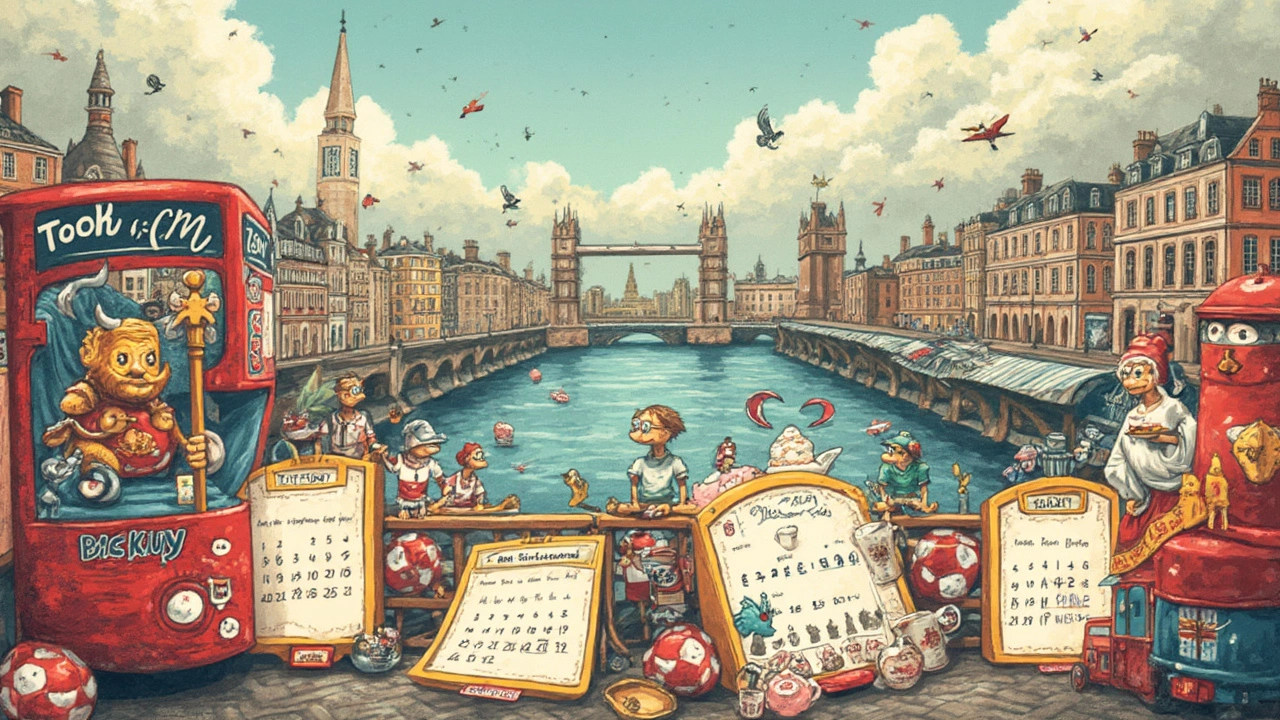7 Days' Names: Where They Come From and Why They Matter for City Breaks
 May, 22 2025
May, 22 2025
Every week is built around the same seven days—but why? Their names aren't random, and if you're planning a city break, timing your trip around them can make a huge difference. Knowing exactly where these names come from adds a layer of fun (and usefulness) to your travel plans.
Say you're booking a getaway to Paris or Rome. You might want to avoid a Monday, because loads of museums shut their doors. Or maybe you're after the buzz of a local market, which only pops up on certain days—those schedules often tie right back to these ancient names. Understanding the background gives you a leg up with timing, saving you from the classic "oops, everything's closed" moment.
- Why Days' Names Matter for City Breaks
- The Origins of Each Day’s Name
- City Vibes by the Day of the Week
- Tips: Picking the Best Day for Your Break
Why Days' Names Matter for City Breaks
Most people never give a second thought to the days of the week, but if you’re planning a city break, their names and the traditions behind them can save you big time. Cities around Europe (and a bunch elsewhere) still set their weekly rhythms by these old labels. For example, in Spain and Italy, many museums and restaurants close on Mondays. In Berlin, some local markets only come to life on Wednesdays or Saturdays. So the whole vibe of a place can flip, depending on the day you show up.
If you’re after local experiences, these rhythms are gold. Sundays in Paris equal quiet streets, closed shops, and families picnicking. In Istanbul, bustling markets hit their peak on Fridays, and Sunday mornings are almost chill because folks sleep in after weekend get-togethers. You’ll notice travel prices change, too, since weekdays often mean lower hotel rates and less tourist crowding—especially if you know when the locals are at work or school.
Here’s the big takeaway: if you want the most from your city adventure, sync your plans with the actual days, not just the dates. It can mean the difference between finding a buzzing festival or running into locked doors and empty plazas. The names of the days aren’t just labels for your calendar; they’re a sneak peek into local routines, peak hours, and secret deals.
- Check museum and market schedules for every city—it really depends on local customs tied to the day’s name.
- Airfare and train tickets often drop midweek; try searching on a weekday rather than the weekend.
- Special religious or public holidays often fall on particular days, shifting what’s open and what’s not.
That’s why being clued in about the days’ background can help you skip hassle and squeeze in more real city moments.
The Origins of Each Day’s Name
Ever looked at a calendar and wondered who decided to call it Monday or Wednesday? The story goes way back to ancient times—think Romans, Vikings, and a whole lot of stargazing. Most names in English come from old gods and planets, mixed with a bit of Latin and Germanic influence. Here’s the real deal behind each name.
- Sunday: Named after the Sun. The Romans called it “dies Solis,” which just means “day of the Sun.” English, German, and even Scandinavian languages hung on to this sun connection.
- Monday: No surprises—the Moon’s day. The Latin was “dies Lunae,” and the Germanic version turned into “Moon’s day,” so we ended up with Monday.
- Tuesday: This one’s quirky. It’s named after the Norse god Tiw or Tyr—a war god, basically. In Latin, it was Mars’ day (the Roman war god), but old English swapped Mars for Tiw, so we get Tuesday.
- Wednesday: Called “Woden’s day” after the top Norse god Odin (Woden in old English). The Romans picked Mercury; we used Woden instead, but the idea’s the same—midweek energy from a major god.
- Thursday: Thor gets the spotlight here. Yep, the thunder god. Thursday is “Thor’s day.” The Latin calendar had it as Jupiter’s day, so both traditions went with the boss of the gods and thunder.
- Friday: Named for Freya (sometimes Frigg), the Norse goddess of love and beauty. It lined up with Venus, the Roman goddess of love. Love wins Friday.
- Saturday: Straight from the Romans again. Saturn’s day—“dies Saturni.” We’re the only Germanic language to keep this one so literal. Most others switched it up, but English stuck with Saturn.
Here’s a handy table summing it up, in case you want to see all those origins in a quick glance:
| Day | Named After (Latin) | English Name Origin |
|---|---|---|
| Sunday | Sol (the Sun) | Sun |
| Monday | Luna (the Moon) | Moon |
| Tuesday | Mars | Tiw (Norse god) |
| Wednesday | Mercury | Woden/Odin |
| Thursday | Jupiter | Thor |
| Friday | Venus | Frigg/Freya |
| Saturday | Saturn | Saturn |
So whenever you’re picking dates for your next city break, remember your week is rooted in mythology and astronomy, not just a random list. These stories might just help out the next time you’re stuck making plans with your travel buddies—or if you want to impress someone over dinner.

City Vibes by the Day of the Week
The feel of a city can totally change depending on the day, and that’s something a lot of people miss when they plan a quick trip. Whether you’re after busy bars, quiet mornings, or fun local festivals, the day of the week seriously matters.
Here’s a quick breakdown of how different days can affect your plans in popular European city break spots:
| Day | Typical City Vibe | Common Closures or Specials |
|---|---|---|
| Monday | Very chill, a bit sleepy—especially in Paris, Florence, and Madrid | Museums and galleries often closed; fewer events |
| Tuesday | More places open, things pick up | Some spots might still be closed, but usually less so |
| Wednesday | Locals get into their weekly groove; a few midweek deals | Shops and markets open; often less crowded |
| Thursday | Pubs and cafes start to get busy in the evening | Special events or happy hours in cities like Berlin or London |
| Friday | Weekend buzz kicks in—best for nightlife | Lively bars, clubs, cultural events everywhere |
| Saturday | Packed streets, open-air markets, all main attractions open | Largest crowds at must-see spots |
| Sunday | Quiet mornings, family time, lazy brunches; some things shut | Shops usually close early or stay shut (especially in Germany and Spain) |
The days names you see on your calendar are way more than just labels—they set the mood of the whole city. For example, it’s a running joke that Paris almost sleeps on a Monday, while Barcelona stretches things out on Sundays with late lunches and sleepy afternoons. In London, the big West End shows have peak performances Friday and Saturday nights, but some museums stay open late once a week—usually Thursday or Friday—so you can skip the crowds and enjoy some culture after dinner.
If you care about shopping, pay close attention to Sundays, especially in Germany, France, and Spain—stores might be shut tight. Looking for big markets or festivals? Check city calendars because a lot of these pop up midweek or on Saturdays. And for nightlife, Thursdays to Saturdays are always more lively, with Fridays being pretty much packed everywhere.
Bottom line: when you plan your city break, think about the kind of vibe you actually want. Do you want to bar hop, hunt vintage finds at a street market, or just soak up the local pace? Match your plans to the day and you’ll get way more out of your getaway.
Tips: Picking the Best Day for Your Break
Most travelers don’t realize that picking the right day for a city break can totally change the vibe and what you get out of your trip. Here’s where a little background knowledge can really save your plans—and your mood. You don’t want to show up ready for action only to find out it’s a citywide rest day.
- Weekday origins still shape city life: In most of Europe, Monday is when a lot of museums and restaurants are closed. That’s their version of a Sunday rest day—just shifted by one because weekends are popular with locals and tourists.
- If you want to snag deals, check Tuesdays and Wednesdays. Hotels and flights are usually cheaper mid-week, since most people travel over the weekend. You’ll also dodge the biggest crowds at tourist hotspots.
- Markets and street fairs often tie to old traditions from certain days. For example, in Florence, the big Sant’Ambrogio outdoor market is busiest on Fridays and Saturdays. London’s Columbia Road Flower Market is famous for its packed Sundays. A quick Google search for “market day” and your city will usually do the trick.
- Looking for nightlife? Thursdays are great in university cities—think Amsterdam or Berlin—because students go out before the weekend prices and tourist crowds kick in. Fridays and Saturdays mean more crowds and sometimes higher drink prices or admission costs.
- In some places, Sundays are sleepy: Think Paris, Madrid, or Vienna. Many shops and restaurants close early or don’t open at all, which can be nice if you’re looking for a chill, quiet vibe in the city.
So, want to make the most out of your city break? Check what’s open, research top events for each day, and plan your arrival around a day packed with stuff you actually want to do. A little prep means no wasted time—and that’s key when you only have a few days to explore.
